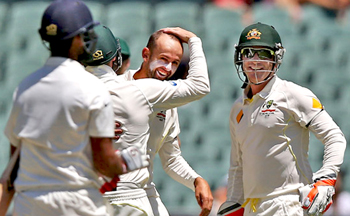 Adelaide, Dec 12: Spinner Nathan Lyon took his sixth five-wicket haul in Test cricket as India collapsed on day four of the first Test against Australia to be bowled out for 444 runs in their first innings here today.
Adelaide, Dec 12: Spinner Nathan Lyon took his sixth five-wicket haul in Test cricket as India collapsed on day four of the first Test against Australia to be bowled out for 444 runs in their first innings here today.
At the Adelaide Oval, Lyon took 5-134 as the visitors lost five wickets for just 75 runs in this morning session and surrendered a lead of 73 runs to the hosts.
Australia had declared their first innings at 517/7 on day three on Thursday.
The off-spinner became only the second spinner in 46 years to take five wickets in a Test innings at home against India, following Bob Simpson who scalped 5-59 at Sydney back in 1967-68. He was ably supported by Peter Siddle (2-88) who recovered from a stomach bug.
Mitchell Johnson (2-102) and Ryan Harris (1-55) were the other wicket-takers in this innings, while Mitchell Marsh (0—29), Steve Smith (0—19) and Shane Watson (0—13) were the other bowlers used.
After a quick change—around then, David Warner (13*) and Chris Rogers (19*) came out to bat for a second time in this match. Mohammad Shami (0—7) and Ishant Sharma (0—10) were the opening bowlers for India. Spin was introduced in only the sixth over as Karn Sharma (0—8) was brought on to make use of the rough patches.
Another sign of the deteriorating pitch was when Murali Vijay (0—7) too was brought on, with Varun Aaron kept away from the attack before lunch. At the break, Australia were placed at 32/0 in 10 overs, a total lead of 105 runs.
Earlier, India began the day at their overnight score of 369/5 with Rohit Sharma (33*) and Wriddhiman Saha (1*) at the crease. Johnson and Harris opened the proceedings for the hosts, but the former wasn’t as intimidating in this spell as he was in the last one bowled late on day three. It allowed the two batsmen to settle down a bit, especially Saha, as they got on with the job of scoring runs.
They had managed to put on 32 runs for the sixth wicket, with Rohit looking to attack Lyon when the spinner was introduced into the attack. It didn’t work as after getting a boundary in the 108th over, the batsman tried to turn one away for a single but only ended up offering a return catch. Lyon snapped it up, diving to his right, and then went on to wreak more havoc six overs later. Rohit scored 43 runs off 89 balls, hitting 5 fours.
Lyon snapped up Saha (25 runs, 68 balls, 2 fours) and Ishant (0) in the space of three balls — the former seemed not out as the ball seemed to have missed his inside edge but umpire Ian Gould didn’t notice. At the other end, Siddle bowled Karn (4) in his maiden Test innings, even as the 400—run mark came up in the 109th over.
The lead at that time was still near 100 runs, but Shami (34 runs, 23 balls, 3 fours, 1 six) then hit out and scored some quick runs and brought the deficit down to 73. Even so, with nearly 170 overs remaining in the match, Australia continued to hold the advantage.
On day one, David Warner had scored a rousing 10th Test hundred, scoring 145 runs off just 163 balls, helping Australia to 354/6 at stumps after winning the toss and electing to bat first on a placid track.
On day two, intermittent rain washed away nearly four hours of play, and in the two hours allowed, Michael Clarke scored his 28th Test ton while Steve Smith scored his 4th Test century to help Australia to a 500—plus total. On day three, Virat Kohli hit his seventh Test hundred to lead India’s good response to the hosts’ score.





Comments
Add new comment